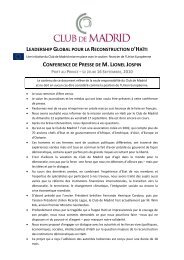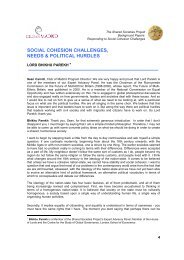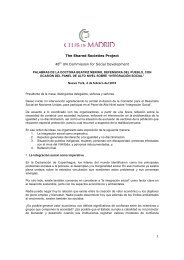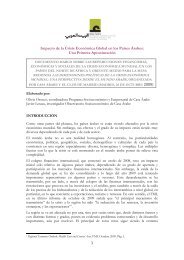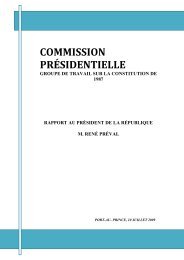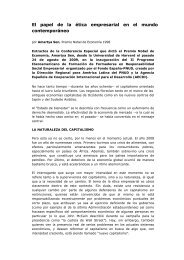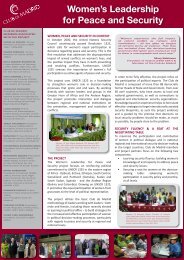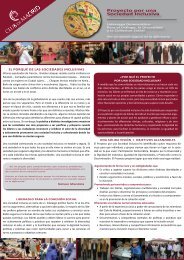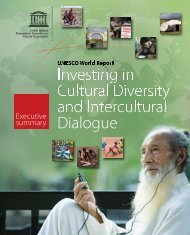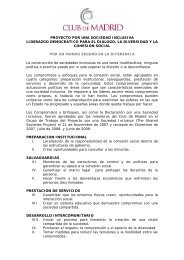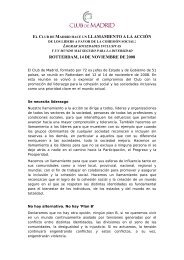Report of Activities 2007 - Club of Madrid
Report of Activities 2007 - Club of Madrid
Report of Activities 2007 - Club of Madrid
You also want an ePaper? Increase the reach of your titles
YUMPU automatically turns print PDFs into web optimized ePapers that Google loves.
CLUB DE MADRID: REPORT OF ACTIVITIES <strong>2007</strong>issued by the <strong>Club</strong> <strong>of</strong> <strong>Madrid</strong>, leaders were called on to look beyond short-term, nationalinterests in order to find solutions based on dialogue, cooperation, regional and internationalagreements and the integration <strong>of</strong> energy infrastructure.EUROPE:Participation in the 2nd European Development Days in LisbonIn early November, the <strong>Club</strong> <strong>of</strong> <strong>Madrid</strong> participated in the 2nd European Development Days inLisbon, a European Commission initiative. The debates focused on the implications <strong>of</strong> climatechange for cooperation between the European Union and developing partner countries.Government representatives from the EU and from African, Caribbean and Pacific countriesmet with representatives from United Nations and Non-Governmental Organisations to discusspossible common solutions for mitigating the effects <strong>of</strong> climate change on development.The high-level round table “Voices from Continents” held on 8 November brought togethermembers <strong>of</strong> the <strong>Club</strong> <strong>of</strong> <strong>Madrid</strong> and <strong>of</strong> the Global Leadership for Climate Action (GLCA)initiatives, as well as distinguished speakers from different continents, in a debate on theirrespective experiences as leaders in the management <strong>of</strong> climate change challenges and howthese interact with development cooperation.The European Development Days were set up with the aim <strong>of</strong> increasing public awareness onsubjects relating to development cooperation, such as the European Consensus for Developmentand how to enhance the efficiency <strong>of</strong> aid with a view to achieving the Millennium DevelopmentGoals. The first meeting for European Development was held in November 2006 in Brussels.About twenty Heads <strong>of</strong> State and Prime Ministers, plus over one thousand political leaders,members <strong>of</strong> civil society and renowned development experts participated in this meeting.Participation in the Community <strong>of</strong> Democracies Conference in MaliThe 4th Community <strong>of</strong> Democracies Ministerial Conference, from 14 to 17 November, inBamaki, Mali, brought together Ministers and governmental representatives from over 100governments and international organisations with about 75 representatives <strong>of</strong> Non-Governmental Organisations, political parties and think tanks from all over the world to debateon the importance <strong>of</strong> democracy for development.During the conference, the participants met in plenary sessions and in regional and thematicpanel sessions and drew up strategies for strengthening international cooperation in support <strong>of</strong>democracy. The former Prime Minister <strong>of</strong> France, Lionel Jospin, participated in the workinggroups on behalf <strong>of</strong> the <strong>Club</strong> <strong>of</strong> <strong>Madrid</strong> and spoke in the final plenary session on theconference’s main theme – Democracy, Development and Poverty Reduction. He presented theorganisation’s contributions to the progress <strong>of</strong> democratic development and its work onexpanding access to energy as a poverty reduction strategy.The Community <strong>of</strong> Democracies was set up in June 2000, with a meeting <strong>of</strong> the Ministers <strong>of</strong>Foreign Affairs <strong>of</strong> over 100 countries held in Warsaw, Poland. The governments present at theConference adopted the Warsaw Declaration, whereby signatories undertook to respect anddefend a number <strong>of</strong> principles and democratic practices and to cooperate in promotingdemocratic government in their countries and elsewhere.At present, the Community <strong>of</strong> Democracies, which comprises 16 governments, meets regularlyto exchange information and coordinate its policies and activities. In November 2002, a second13/17



